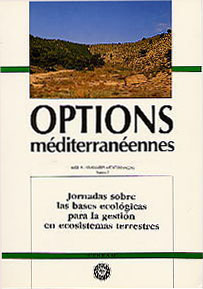| Article précédent | p. 47-52 | Article suivant |
Efecto de la competencia interespecífica en poblaciones de Juniperus thurifera
Basal area, density and biomass have been studied in 17 pure stands of Juniperus thurifera and 40 mixed stands with several combinations of that species and others of the genura Pinus and Quercus in SW quarter of the province of Teruel (Aragon, Spain). We have evaluated the effects of the competition between species for Juniperus thurifera through the substitution of the species analysis. The applicability of this method to natural populations of trees is discussed. There is no simple response to competition, with advantage or disadvantage, but a multiple one. A clear feature is that J. thurifera has always an antagonist behaviour towards its competitors, and when there is advantage for one of them there is disadvantage for the other one. Some hypothesis on the dynamics of the interspecific competition between J. thurifera and its competitors are proposed, assuming that evolution of mixed stands in time is related to the increase and decrease of the relative density of each species in the stand.
- [ Afficher ]
- [ Télécharger ]
- [ Exporter la citation ]
Vous pouvez télécharger la citation au format :
- [ Imprimer ]
-
Mots-clés
BIOMASSE, DENSITE DE POPULATION, DIMENSION, DISTRIBUTION GEOGRAPHIQUE, ESPAGNE, JUNIPERUS, MODELE DE SIMULATION, ZONE MEDITERRANEENNECiter cet article
Comin P. Efecto de la competencia interespecífica en poblaciones de Juniperus thurifera. In : Bellot J. (ed.). Jornadas sobre las bases ecológicas para la gestión en ecosistemas terrestres. Zaragoza : CIHEAM, 1989. p. 47-52. (Options Méditerranéennes : Série A. Séminaires Méditerranéens; n. 3). Jornadas sobre las Bases Ecológicas para la Gestión en Ecosistemas Terrestres, 1988/06/13-15, Zaragoza (Spain). http://om.ciheam.org/om/pdf/a03/CI000504.pdf



